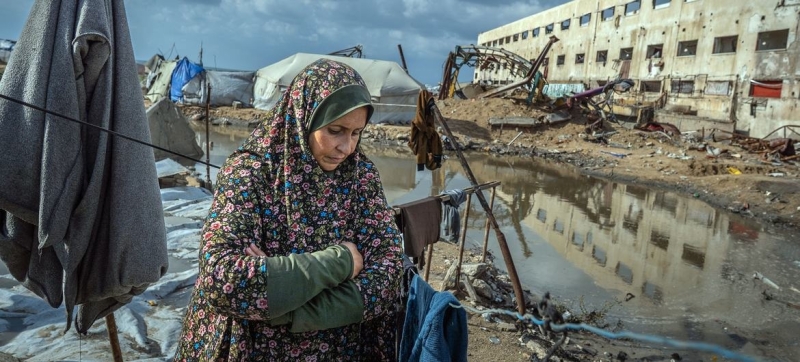- Mojtaba Khamenei Named Iran’s New Leader |
- Iran vows to hit all ME economic hubs if US-Israeli attacks persist |
- Sammilito Islami Bank merger to continue: Governor |
- Biman Suspends Flights to Six Middle East Cities Over Tensions |
- Govt Announces 25pc Rail Fare Discount |
Aid Access and Health Services Still Strained in Gaza

A woman in Gaza stands outside her tent, which was flooded after a sewage system nearby overflooded due to heavy rain.
Aid deliveries into Gaza continue to face severe constraints as fighting persists across the territory, with the UN warning that most hospitals remain only partially operational and more than 16,500 patients still require urgent medical evacuation.
Briefing reporters in New York on Wednesday, UN Spokesperson Stéphane Dujarric said hostilities in several parts of the Gaza Strip continue to cause casualties and repeatedly disrupt humanitarian operations.
On Tuesday, the UN and its partners coordinated eight planned humanitarian movements inside Gaza with Israeli authorities. Only one movement was facilitated, while the remaining seven were impeded, denied or cancelled.
Despite the obstacles, UN teams managed to collect more than 200 pallets of medicine and five tankers of fuel from the Kerem Shalom/Kerem Abu Salem crossing. Additional tents were also retrieved from the Kissufim crossing.
“Every delivery into Gaza makes a significant difference,” Mr Dujarric said.
Health system barely functioning
Mr Dujarric stressed that Gaza’s health system remains critically fragile.
“Not a single hospital in Gaza is fully functional,” he said, noting that only 18 of the Strip’s 36 hospitals are currently partially operational.
On Monday, the UN World Health Organization (WHO) facilitated the evacuation of 33 Palestinians in need of critical care, along with more than 100 companions. However, the scale of unmet medical need remains overwhelming.
“There are still more than 16,500 patients who need medical care outside Gaza,” he said.
WHO continues to call for safe access through all evacuation routes, particularly to the West Bank, including East Jerusalem, and urges that medical evacuation convoys be expedited at crossings.
Maintaining education
UN agencies are also working to sustain essential civilian services. The UN agency for Palestine refugees (UNRWA) is maintaining learning activities for displaced children across Gaza.
As of Sunday, UNRWA was operating nearly 350 temporary learning spaces in 64 shelters, providing in-person education to more than 47,000 boys and girls.
Humanitarians continue delivering other forms of critical support.
Call for unimpeded access
Mr Dujarric said the UN and its partners are ready to scale up operations if restrictions ease.
“We once again call for unimpeded humanitarian access so that teams can reach everyone in need,” he said.
“We and our partners can do much more as soon as restrictions on relief items and aid groups are lifted.”

